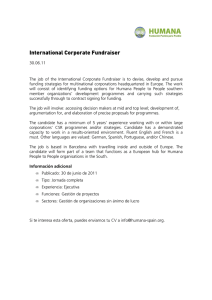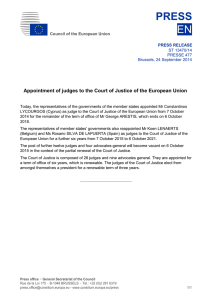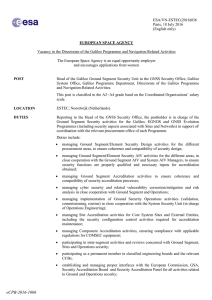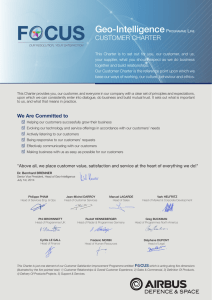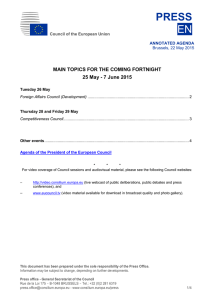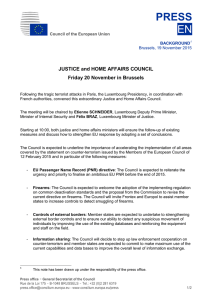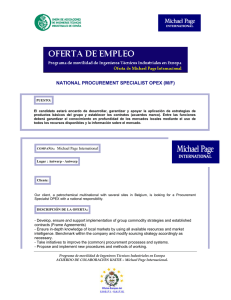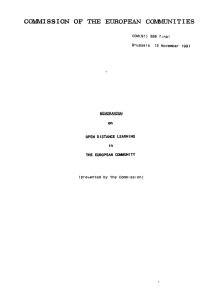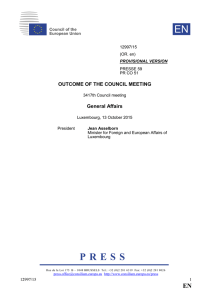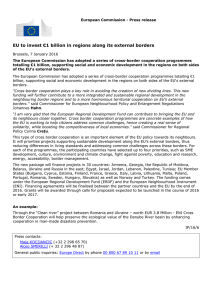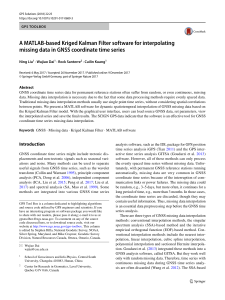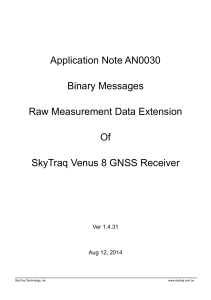Council Conclusions on launching the European Global Navigation
Anuncio
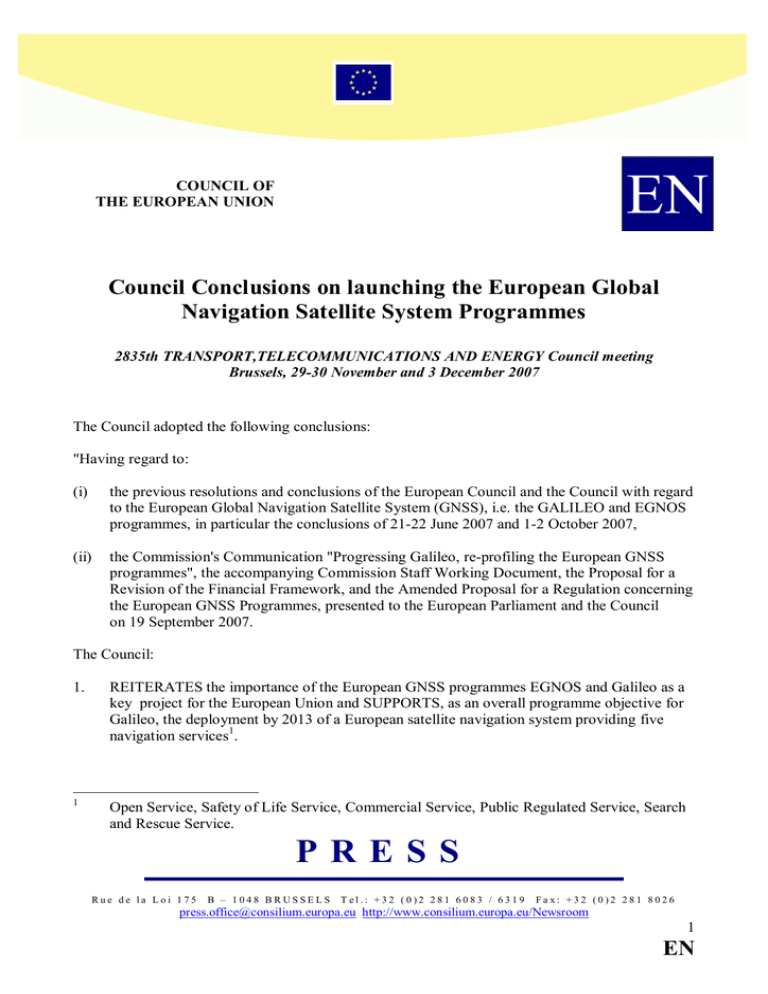
EN COUNCIL OF THE EUROPEAN UNION Council Conclusions on launching the European Global Navigation Satellite System Programmes 2835th TRANSPORT,TELECOMMUNICATIONS AND ENERGY Council meeting Brussels, 29-30 November and 3 December 2007 The Council adopted the following conclusions: "Having regard to: (i) the previous resolutions and conclusions of the European Council and the Council with regard to the European Global Navigation Satellite System (GNSS), i.e. the GALILEO and EGNOS programmes, in particular the conclusions of 21-22 June 2007 and 1-2 October 2007, (ii) the Commission's Communication "Progressing Galileo, re-profiling the European GNSS programmes", the accompanying Commission Staff Working Document, the Proposal for a Revision of the Financial Framework, and the Amended Proposal for a Regulation concerning the European GNSS Programmes, presented to the European Parliament and the Council on 19 September 2007. The Council: 1. REITERATES the importance of the European GNSS programmes EGNOS and Galileo as a key project for the European Union and SUPPORTS, as an overall programme objective for Galileo, the deployment by 2013 of a European satellite navigation system providing five navigation services1. 1 Open Service, Safety of Life Service, Commercial Service, Public Regulated Service, Search and Rescue Service. PRESS Rue de la Loi 175 B – 1048 BRUSSELS T el.: +32 ( 0)2 281 6083 / 6319 Fa x: +32 (0)2 281 8026 press.office@consilium.europa.eu http://www.consilium.europa.eu/Newsroom 1 EN 2. UNDERLINES the economic and public merits of the programmes, the direct benefits of Galileo in terms of new services and markets, increased performance, and complementarity with GPS. 3. ACKNOWLEDGES that the Commission's estimated cost for the European GNSS programmes for the period 2007 - 2013 amounts to 3.4 B€, including the procurement of the Full Operational Capability of Galileo, operational costs, the costs for EGNOS, the procurement agent, programme management costs and a contingency reserve, and CONSIDERS that this should constitute the ceiling for expenditure during this Financial Perspective. 4. TAKES NOTE of the estimations of the Commission for the costs and risks after 2013, including costs for operations, maintenance and replenishment. These costs may be partly offset by revenues from Galileo services. 5. RECOGNISES that the identified risks of the European GNSS programmes do not require specific budgetary measures at this stage, over and above the foreseen contingency reserve. 6. WELCOMES the Commission's commitment to implement an integrated programme risk management structure for all phases and levels of the programme and to implement structural measures in order to identify, control, mitigate and monitor such risks, including through the relevant contracts and agreements. 7. SUBSCRIBES fully to the need for a stream-lined and effective public sector governance of the European GNSS programmes and the need for a clear division of roles; and AGREES in particular that the following principles should be applied for the deployment phase under public procurement: Political decision making and oversight a) The Council and the European Parliament remain the Budgetary Authority and ultimate political decision-making bodies for the programmes, in particular for the overall programme objectives and definition of services that will be provided by EGNOS and Galileo, for the procurement principles and for the decisions on the subsequent phases of the programmes; b) All Member States should maintain the political oversight of the programmes and therefore have full access to information to be provided by the Commission, upon request by the Presidency; Management and execution c) The responsibilities within the European Community should be clearly defined, in particular those of the European Commission and of the European GNSS Supervisory Authority (GSA); PRESS Rue de la Loi 175 B – 1048 BRUSSELS T el.: +32 ( 0)2 281 6083 / 6319 Fa x: +32 (0)2 281 8026 press.office@consilium.europa.eu http://www.consilium.europa.eu/Newsroom 2 EN d) The Commission should be fully responsible for the overall management of the programmes as the European GNSS Programme Manager, while Member States should be closely associated with the essential elements of the management of the programme, in particular the work programme and the programme implementation plan and associated financing, through a European GNSS Programmes Committee to be established in accordance with the European Community comitology procedures; e) The GSA should retain the responsibility for, in particular, technical certification, security accreditation, market preparation and commercialisation of the system, and assist the Commission for all matters related to the execution of the programmes; f) The European Space Agency (ESA) should act as procurement agent for Galileo, subject to the future agreement between the European Community, represented by the Commission, and the ESA; this agreement, to be submitted to the European GNSS Programmes Committee, should be clear and transparent and define the requirements and control measures to be put in place as well as tendering procedures, including appeal and dispute settlement procedures; g) The questions relating to the security of the systems should be considered as follows: • an appropriate security experts group, including all Member States and working on the basis of consensus, should examine matters related to the security of the systems, • the definition of the main requirements for the security of the system should be decided in accordance with the regulatory procedure, taking full account of the opinion of the security experts group, • the security accreditation of the system is the responsibility of the GSA, • whenever the security of the EU or its Member States may be affected by the operation of the system as foreseen by the Joint Action 2004/552/CFSP, the procedures of the Joint Action should be followed. • Matters falling within Title V and/or Title VI of the Treaty on European Union will not be within the remit of the European GNSS Programmes Committee. The oversight and integration of security requirements in the overall programme should be ensured by the European GNSS Programmes Committee. Ownership h) The European Community should have the ownership of all the tangible and intangible GALILEO and EGNOS assets. PRESS Rue de la Loi 175 B – 1048 BRUSSELS T el.: +32 ( 0)2 281 6083 / 6319 Fa x: +32 (0)2 281 8026 press.office@consilium.europa.eu http://www.consilium.europa.eu/Newsroom 3 EN 8. ACKNOWLEDGES that the decision to re-profile the European GNSS programmes requires an adjustment to the regulation concerning the GSA and REQUESTS the Commission to submit the appropriate proposal in the near future. 9. REITERATES its will to ensure: a) a balanced participation of all Member States during the different phases of the project while taking maximum benefit of open competition; b) the need to reflect progress made so far in order to ensure value for money and to introduce competition in the supply chain to avoid to create a monopoly supply situation; c) that stakeholders in all Member States, especially small and medium sized enterprises (SME), have opportunities to develop and innovate on the basis of the technological know-how arising from the Galileo procurement. 10. 11. CONFIRMS the application of the following main principles for the procurement: a) introduction of robust and fair competition in the programme allowing to attain value for money, improve efficiency, decrease dependencies, and foremost to control costs and mitigate risks; b) open access and fair competition throughout the industrial supply chain, offering a chance to balanced participation of industry at all levels, including in particular SME, across the Member States; c) recognition of the existence of a limited number of main suppliers in the space sector and need to avoid possible abuse of dominance or long-term dependency on single suppliers; d) tendering on the basis of the provision of transparent and timely information, clear communication of the applicable procurement rules, selection criteria and any other relevant information allowing a level-playing field for all potential bidders for the present and future phases of the programme; e) take advantage of prior public sector investments and lessons learned as well as industrial experience and competences, including that acquired in the definition and development phases of the European GNSS programmes, while ensuring that competitive tendering shall not be prejudiced. CONFIRMS the application of Community's public procurement rules and the following principles for the procurement of the Full Operational Capability (FOC) of Galileo: PRESS Rue de la Loi 175 B – 1048 BRUSSELS T el.: +32 ( 0)2 281 6083 / 6319 Fa x: +32 (0)2 281 8026 press.office@consilium.europa.eu http://www.consilium.europa.eu/Newsroom 4 EN 2 a) split of the procurement of the infrastructure into a set of six main work packages2 as well as a number of additional work packages, through a comprehensive overall procurement break-down; this does not rule out the prospect of multiple simultaneous procurement strands for individual work packages, including of satellites; b) all work packages for FOC Galileo should be open to the maximum possible competition, in line with EU procurement principles, and to ensure procurement in space programmes are more widely open to new entrants and SMEs, while ensuring technology excellence and cost effectiveness; c) competitive tendering of all packages in a single procedure whereby any one independent legal entity, or legal entities part of a group, may bid for the role of prime contractor for a maximum of two of the six main work packages; d) at least 40% of the aggregated value of the activities to be subcontracted by competitive tendering at various levels to companies other than those belonging to the groups of which entities will be prime contractors of any of the main work packages; e) dual sourcing wherever appropriate in order to mitigate programme risks and avoid single-source dependencies and to ensure better overall control of programme, cost and schedule; f) possibility for European industries to rely on non-European sources for certain components and services in case of demonstrated substantial advantages in terms of quality and costs, taking account of the strategic nature of the European GNSS programmes and of the EU security and export control requirements; g) implementation of an integrated programme risk management at all levels of the programme as well as structural measures to identify, control, mitigate and monitor risks; h) implementation of the above elements and principles on the basis of an EC-ESA Delegation Agreement in all industrial contracts. System engineering support, ground mission infrastructure completion, ground control infrastructure completion, satellites, launchers and operations. PRESS Rue de la Loi 175 B – 1048 BRUSSELS T el.: +32 ( 0)2 281 6083 / 6319 Fa x: +32 (0)2 281 8026 press.office@consilium.europa.eu http://www.consilium.europa.eu/Newsroom 5 EN 12. ACKNOWLEDGES that decisions on the follow-up of the Galileo deployment phase, namely with regard to the commercial operating phase of the European GNSS programmes can only be taken after a phase of detailed technical, commercial, financial, and programmatic studies; and INVITES the Commission to undertake these studies and analysis by the end of 2008 and come forward with proposals at the appropriate moment. Community's public procurement rules should be fully applied. 13. REQUESTS to the Commission regular and transparent reporting on the progress of the implementation of the European GNSS programmes. For this purpose, the Council welcomes the Commission's commitment to call upon an independent project management expert team to review the implementation of the programmes and make appropriate recommendations. These recommendations shall also be communicated to and reviewed by the European GNSS Programmes Committee on a annual basis. 14. REQUESTS the Coreper to further work without delay on the inclusion of the herein defined principles into the relevant legislative acts. 15. ADOPTS these Conclusions as part of an integrated political decision on the European GNSS programmes. * * * PRESS Rue de la Loi 175 B – 1048 BRUSSELS T el.: +32 ( 0)2 281 6083 / 6319 Fa x: +32 (0)2 281 8026 press.office@consilium.europa.eu http://www.consilium.europa.eu/Newsroom 6 EN Procurement Structure Main Work Packages contracted by ESA* Description Systems Work Package 1. System Engineering support A contract is placed with a mixed industrial team to support all system design choices and decisions. This industrial team supports ESA all along the implementation process, up to and including system specifications, performance analysing, testing, verification and validation of all elements of the infrastructure. Supply Work Packages 2. Ground mission infrastructure completion The completion of the ground mission elements (provision of the navigation signals and messages) by means of an upgrade of the development infrastructure and deployment of the additional facilities up to a full operational capability status. 3. Ground Control infrastructure completion The completion of the ground control elements (control of the individual satellites) by means of an upgrade of the development infrastructure and deployment of the additional facilities up to a full operational capability status. 4. A total of 26 Satellites: a. Satellites A An initial batch of 10-12 satellites. b. Satellites B A second batch of 6-8 satellites, based on demonstrated performance in the delivery of Batch A c. Satellites C A third batch of 6-8 satellites, based on demonstrated performance in the delivery of Batch B 5. Launchers A contract for launch services with reliance on two or, if possible, more technically independent families of launchers. Operations Work Package 6. Operations Operations activities are contracted to an operator. The operator coordinates the entire Galileo operations in order to ensure a successful navigation mission. The concept of operations for the Galileo system is based on two Galileo Satellite Control Centres (GCS/GMS) in Fucino and Oberpfaffenhofen; and a Safety-of-Life Centre in Madrid operated on a 24/7 basis responsible for Safety-of-Life multimodal services and applications. The Safety-of-Life Centre will include both the necessary modules to guarantee the proper levels of integrity, continuity and availability of the system based on a GMS in cold back-up mode and a GCS with identical physical configuration and equivalent functional attributes to the other GCS. Through the centres, the operator is tasked to achieve the mission performances, to control the operational status and ensure the maintenance of the complete ground infrastructure and associated communication network, and to manage its maintenance. The Commission takes note that the Safety-of-Life Centre may decide to evolve to a fully qualified, equivalent Galileo Satellite Control Centre, the assets of which will be owned by the Community. The investment of this evolution will be without additional costs to the agreed Community budget for the European GNSS programmes for the period 2007-2013. Whilst not affecting the operational capabilities of Oberpfaffenhofen and Fucino, the Commission in that case will ensure that this Centre will be fully operationally qualified as a Galileo Satellite Control Centre by the end of 2013, subject that it is able to meet all the necessary requirements applicable to all centres and will be included in the Galileo network of the three centres mentioned above. * If performance in the delivery of the work packages, or the batches therein, is not satisfactory appropriate adjustments may be implemented, where possible, including competitive tendering of remaining work. 7 EN Additional Work Packages contracted by ESA Description Test receivers Multiple-source contracts for test receiver manufacturing. Service contracts Contracts with the various service providers and centres for proper functioning of the overall system architecture, such as Time Service Provider, Geodesy Service Provider, Search and Rescue interfaces. Infrastructure supply elements Infrastructure elements that are provided independent of the above service contracts, such as the Galileo Security Monitoring Centre to be operated by the GSA. Additional Work package contracted by the Commission Description Performance Measurements A contract for independent measurement of Key Performance Indicators ________________ 8 EN
